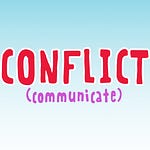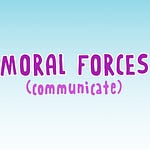Abbie: Hello and welcome to the CosmoParenting Podcast brought to you by the CMM Institute for Personal and Social Evolution. In this space, we invite you to see yourself as someone who is curious about and actively participating in creating your own meaning around parenting.
Today, we are wrapping up our second three themes of the year with our ‘Relate’ episode, where we will dive a little deeper into the relationship between the previous three themes- Relationships, Moral Forces, and Conflict.
Let's begin.
*music*
Abbie: Today, I am joined by Jordan Allen. She is a scholar of interpersonal and family communication. She is an assistant professor of communication at Utah Valley University, and her research investigates the ways individuals negotiate, manage, and sometimes mismanage challenging family conversations. Absolutely perfect for our topic today. Jordan, thank you for being a part of our ongoing conversation here.
Jordan: Yeah. Thank you so much for having me. I'm so excited.
Abbie: Good. I'm excited too. And as you know, today we are, well, we're going to do our best to cover the last three themes together. And that is Relationships, Moral Forces, and Conflict. Particularly, I'm hoping that we can learn from you as a family communication scholar. Just as a brief recap- if I could distill these last three themes into one thing each, I want us to remember that relationships are co-created, that moral forces are essentially the ‘shoulds’ in our life, and conflict does not always have to feel so bad. So keeping that in mind, Jordan, what do you see the relationship between Relationships, Moral Forces, and Conflict being?
Jordan: Yeah, absolutely. So all three of these- from a communication perspective- they're really intricately related with one another. And so moral forces being like the ‘should’ guides a lot of how we co-create our relationships.
And, and in fact, like from my kind of theoretical perspective, moral forces are, they're almost like another person that's in our relationship, shaping our relationship. And so of course with conflict, what we ‘should’ be doing or how our relationships ‘should’ look is often a guiding force of how we behave and communicate in conflict.
And the scary thing I think about all three of these things is that we take for granted what they have to look like. So kind of like that unacknowledged, almost unintentional aspect. So if you have a romantic partner or a child, we have an image and we don't even really know where it comes from, like consciously. It's because, you know, years of socialization about what that relationship should look like. And should is the key part here.
And so really broadly, all three of these things are so tied together. And I think we don't often spend enough time thinking about where those messages come from, where's the idea that, you know, a parent child relationship has to be intimate, or it has to be harmonious, like there doesn't- there shouldn't be conflict or something like that.
Where does that even come from? And then thinking also about how is that currently shaping the way that I interact? So that's how kind of I see all three of those fitting together.
Abbie: The way I've kind of been conceptualizing it, which is maybe over-simplistic, but just trying to kind of think about the relationship between these three is a kind of “moral forces + relationships = conflict,” which I feel like mirrors what you're saying is that the relationship between how these things work together in our lives is that we're bringing our moral forces (again, whether we've named them or not) into our relationships. And then naturally in relationships is where conflict happens because you're bumping up against someone with their own moral forces, which they may or may not be able to name. And so because we've defined conflict as different needs, different forces, that makes a lot of sense.
And I think that's why the place to start with CosmoParenting, with what I hope we're sharing with people in the world, is that the very first step is naming and beginning to have language to be able to call out and say for yourself, for your partner, for your children- “These are the moral forces. These are the stories. These are the messages that I am bringing with me into this relationship.”
And I think what happens as a result of that is a kind of normalizing, which I think there's something really, really important and powerful about normalizing having different stories, having different moral forces, having relationships that look the way that they look and conflict that is the way that it is.
Because if we can let go of those ‘should’ stories, then we can just be present to what is, I think, in our relationships.
Jordan: Oh, I agree entirely. And I think that one of the things that as a communication scholar, I always like to draw people's attention to is the moral forces behind what we think communication ought to look like. And so we've inherited this model. It's a really new model. It comes from the 1950s, comes from broadcast journalism, really how we think we should be communicating comes from how radio waves were sent and received and then feedback...
All of that is very technical language.
The problem with that is that it comes with this idea that communication should be clear and healthy relationships should be absent of conflict. But when we're saying conflict, often that's getting conflated with bad feelings. So, like, no small part of my PhD has been spent like professionally, but also just personally fielding this question, which is how do I communicate this message personally? But what gets unsaid in that question is… to achieve what I want to achieve?
And when we don't acknowledge that communication is shared, co-constructed, negotiated- it's not sending a message- it's negotiating a message with someone else.
And when we don't view communication as negotiation, we- it becomes very, very difficult because all of a sudden negative emotions like maybe anger or sadness or something like that comes up as a sign that we're doing something wrong.
And that can cause conflict to escalate. It can cause us to avoid conflict when we ought to be engaging in conflict- constructive conflict to be sure. But that's one thing that I would say is to think carefully about when you're communicating- what are the ‘shoulds’ around the way that you're thinking about communication?
Because when we're so outcome focused, like how do I get my kid to do this- go to bed at their bedtime without fighting? I mean, that can be a goal and it's certainly something to have in mind. But when we start to solidify that outcome, we start treating communication as though it's an algorithm- Do one thing plus one thing plus one thing to achieve this goal. And of course, that's not how it works. You could be the most expert in communication and deliver the most expert message… You still might not get what you were hoping for.
And in fact, you having a firm, rigid idea of what you're hoping for from an interaction can inhibit your ability to communicate. For me, I always tell my students that the number one communication skill they should be developing or practice… should, you hear my should!
Abbie: Hahaha! It's in there. It's in there.
Jordan: … is curiosity. And so people don't often think of curiosity as a communication skill, but it absolutely is. And so curiosity about Oh, I have this idea or I have this strong feeling for myself.
Where is that coming from?
Why is it there?
Why am I having this reaction?
How is it enabling my communication?
How is it constraining my communication?
And then also using that curiosity with other people, particularly in conflict, because when you're curious about where things come from and you can hold the ‘should’ and the moral forces more lightly. You can't get rid of them; they're always going to be there.
Something kind of interesting happens in communication and interaction. So when we're curious, we're not trying to make a point. We're not trying to achieve an outcome. But curiosity will achieve an outcome, right? But it helps us negotiate and sit in communication as negotiation versus communication as sending a message and being understood.
Abbie: Mmm. Yeah.
Jordan: Which is one of, I think, one of the most toxic ways that we can view communication. And of course it's the most popular.
Abbie: Yeah.
Jordan: But when we're curious about other people and we're curious about ourselves, conflict becomes a lot less frightening and also just accepting we're not going to feel good all the time when we're in relationship or when we're in communication and that's okay too.
So I love what you're saying about normalizing. Normalizing just because I feel bad after a conflict with my mom or something doesn't mean that communication was bad or that interaction wasn't somehow fruitful. It just means that in this moment, I feel bad.
Abbie: Yeah. I think that's a great way to put it. That makes so much sense to me and is maybe another kind of through line or way that we could conceptualize the relationship between these three is that each of them- relationships, moral forces, and conflict- they deserve our curiosity.
Jordan: Yeah.
Abbie: And we can navigate them better if we approach them with curiosity. So, Jordan, as we wrap up, what do you want to leave us with today?
Jordan: To hold the idea that relationships or conflict has to look a specific way very lightly, because I can tell you as a communication scholar, and I've studied estranged families, my specialty is non-normative family structures.
And so I can tell you from years of research and experience that there's a lot of different ways that relationships and conflict can look. And that if you can find the way conflict needs to look for your relationship now- might be different in five years, might've been different five years ago- you're going to be doing better for yourself than trying to achieve this harmonious or this picturesque relationship because it's you, because you're negotiating it with you and your relationship instead of what should be… Even though it's important to keep that in mind too.
Abbie: Yeah, Jordan, thank you so much for joining me today. Thank you for your perspective, all the wisdom you've shared and everyone listening, thank you for joining us too. Don't forget to check out www.cosmoactivities.com for all our other free resources in this series.
And be sure to comment on this podcast episode on the CosmoParenting Substack. We are really leaning into the idea of collective learning here. We have so much to learn from each other. So help us out by sharing what you are learning along the way with us. We're so grateful to be on this journey with you and we'll look forward to joining you next week for the first episode of our Power Theme.
*music*











Share this post